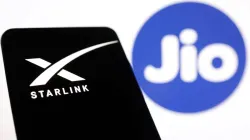Starlink India entry faces new hurdle: Reliance pushes for satellite spectrum auction
Indian telecom operators are urging the government to adopt an auction process for allocating satellite internet spectrum. However, in the past, the government has indicated that it will stick to an administrative allocation method for satellite internet.

Mukesh Ambani's Reliance Industries recently urged India's telecom regulator to rethink its decision to allocate satellite spectrum without an auction, marking a fresh confrontation with Elon Musk's Starlink. Last month, India’s Telecom Minister Jyotiraditya Scindia announced that the government would follow a global trend of administratively allocating spectrum, with the final announcement pending feedback from the Telecom Regulatory Authority of India (TRAI).
Starlink has shown interest in launching its services in India after a successful rollout in Africa, which left local providers struggling due to low broadband prices. The company supports the government’s plan for spectrum allocation. However, Ravi Gandhi, a senior policy executive at Reliance, called on TRAI to reconsider this decision during an open forum, labelling the administrative allocation method as "the most discriminatory way of distributing any government resource."
Meanwhile, Parnil Urdhwareshe, a representative from Starlink, referred to India’s allocation strategy as "forward-looking." Ambani helms Reliance Jio, the largest telecom operator in India, and analysts believe that a spectrum auction, which demands significantly higher investment, could discourage foreign competitors.
The recommendations from TRAI, set to be developed in the coming weeks, will play a pivotal role in shaping the future of satellite spectrum allocation. Reliance has dominated India’s telecom landscape for years and is worried about the possibility of losing broadband customers to Musk's venture, with the risk extending to data and voice clients as technology continues to evolve, as previously reported by Reuters. The method of distributing spectrum for satellite services in India remains a contentious issue between these two billionaires.
Meanwhile, the Department of Telecommunications (DoT) has requested that Starlink and Amazon Web Services complete the necessary security compliance in order to advance their applications for satellite internet services in India.
In contrast, Airtel’s Eutelsat OneWeb and Jio’s SES have already obtained approvals for their satellite services. Currently, Starlink and Amazon have not submitted the required security documentation.
ALSO READ: iQOO 12 gets massive price cut ahead of iQOO 13 launch
Inputs from IANS
